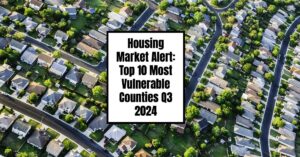The looming insurance crisis in the United States could potentially trigger a housing market crash worse than the one experienced in 2008. A recent report from the Senate Budget Committee warns that the increasing frequency and severity of extreme weather events, largely attributed to climate change, are jeopardizing the stability of homeowners' insurance markets (Newsweek).
If insurers retract coverage in areas susceptible to climate risks, the housing market could face dire consequences, leading to significant drops in property values and an inability for many to secure mortgages.
Insurance Crisis Could Lead to a Worst Crash in the Housing Market
Key Takeaways
- Insurance Market Instability: Homeowners' insurance markets are under threat from climate change.
- Mortgage Accessibility: Rising insurance premiums may make many properties unmortgageable.
- Wealth Erosion: A decline in property values could significantly diminish household wealth across the U.S.
- Systemic Risk: The potential housing market crash could pose a risk to the broader economy, reminiscent of the 2008 financial crisis.
- Immediate Action Needed: Policymakers must act swiftly to mitigate these risks and protect homeowners.
Understanding the Connection Between Insurance and Housing Markets
The Senate Budget Committee's report highlights a critical issue—the connection between homeowners' insurance and the housing market is stronger than many realize. Since insurance is mostly a requirement for obtaining a mortgage, fluctuations in insurance availability and affordability can lead directly to fluctuations in home buying capabilities.
If insurance companies withdraw coverage from economically vulnerable areas, it leaves homeowners without the necessary protection. Consequently, mortgage lenders are likely to hesitate to finance homes in those regions, leading to a freeze in real estate transactions.
Why Are Insurance Markets So Vulnerable?
The root cause of this impending crisis lies in the escalating effects of climate change. As extreme weather events—hurricanes, wildfires, floods—become more common and severe, insurers find themselves facing larger payouts than previously anticipated. Florida, California, and Louisiana are leading examples of states struggling with skyrocketing homeowners' insurance premiums due to fear of losses from such disasters, with the nonrenewal rates in 2023 reaching 2.99% in Florida and 1.8% in Louisiana, respectively, according to the report by Newsweek. The reality is that as these climate-related risks become more pronounced, insurers might simply opt out of providing coverage in high-risk areas altogether.
The Ripple Effect on Homebuyers
As a consequence of this instability within the insurance market, aspiring homebuyers are finding it increasingly difficult, if not impossible, to secure a mortgage for homes in affected areas. The market already reflects rising prices due to decreased insurance availability combined with high demand. The Senate Budget Committee indicates that the inability to obtain mortgages could lead to lower demand for homes, effectively crashing housing prices.
A Significant Retreat from Insurance Coverage
The report indicates that there has been a uniform retreat from homeowners' insurance across high-risk areas in the past few years, with premium rates soaring amid fewer companies willing to underwrite policies. This decrease in availability is indicative of a larger pattern affecting homeowners as insurance becomes not just expensive but unattainable in many instances.
The Economic Implications of a Housing Crash
The implications of a potential housing crash are vast and alarming. According to the Senate Budget Committee, homes represent the greatest source of wealth for most Americans, meaning that any decline in property values will directly erode household wealth across the nation.
The situation is even more precarious when considering that the decline in asset values could fuel a wider economic downturn, similar to the events witnessed during the 2007-2008 financial crisis. Households that lever long-term financial strategies around their home values could deeply suffer in this kind of downturn.
A former chief economist for Freddie Mac, Sean Becketti, ominously commented on the scenario, stating that predicted declines in property values due to climate-related events could be “greater in total than those experienced in the housing crisis and Great Recession,” although these declines may occur gradually rather than all at once. This slow burn can be more dangerous, embedding the risk into the economy more thoroughly, as opposed to a rapid collapse that allows for quicker recovery.
Lessons from the 2008 Crisis
When reflecting on the 2008 housing crash, it’s essential to acknowledge the differences between that financial collapse and the current challenges posed by climate change. In the past, the financial system and asset values were able to bounce back over time. However, the permanence of climate-related risks raises serious concerns: as properties become increasingly insurable unworthy, they risk suffering from long-term declines in value and burgeoning economic instability. The much slower, insidious nature of climate change means that the repercussions could persist for years or even decades without the opportunity for a clean recovery.
Insurance and Mortgage Accessibility
In many regions, the situation is dire, with rising insurance premiums and limited coverage making it nearly impossible for individuals without significant cash reserves to enter the housing market. The Senate Budget Committee’s report clearly states that the situation could lead us to an economic scenario reminiscent of 2008. If the availability of insurance further stagnates, it’s likely that home values will tumble, pushing household wealth downwards and exacerbating existing financial strains across the board.
Looking Forward: Can We Prevent a Crisis?
The report warns that states currently grappling with insurance instability are merely “canaries in the coal mine”. Other states throughout the nation could soon face similar challenges. The message from the Senate Budget Committee is clear: individuals and policymakers must be prepared for the growing insurability crisis and take proactive measures to address systemic risks before they worsen.
Policymakers need to look beyond the immediate concerns of property and mortgage values and instead consider the long-range implications of climate change on wealth and the overall U.S. economy. As climate events increase in frequency and intensity, so too must our strategies for handling these challenges evolve.
Conclusion
While it is too early to predict the exact timeline or scale of such an event, the findings and warnings provided by the Senate Budget Committee cannot be ignored. The interconnectedness of insurance markets and housing values presents a daunting reality, one that underscores the need for immediate action. Homeowners, potential buyers, and policymakers alike must reclaim agency over this situation before it spirals into a crisis that leaves vast sectors of the population and economy in jeopardy.
Related Articles:
- Housing Market Crisis: Only 25% of Homes Sold to First-Time Buyers
- Housing Markets at Risk: California, New Jersey, Illinois, Florida
- Housing Market Alert: Top 10 Most Vulnerable Counties Q3 2024
- 3 BIG Cities Facing High Housing BUBBLE Risk: Crash Alert?
- Why a 2008-Style Housing Market Crash is Unlikely in 2025?
- Housing Market Crash: Expert Says Market is Ready to Pop
- Housing Market Crash 2008 Explained: Causes and Effects
- Will the Housing Market Crash in 2025?
- Here's Why Housing Market Crash Predictions Are Overblown!
- Will the Housing Market Crash: Top Cities Where Prices Are Soaring
- If The Housing Market Crashes What Happens To Interest Rates?









 One of the most exciting things about being a real estate investor is knowing what markets will produce the greatest long-term returns – especially while in the middle of a challenging housing market.
One of the most exciting things about being a real estate investor is knowing what markets will produce the greatest long-term returns – especially while in the middle of a challenging housing market.